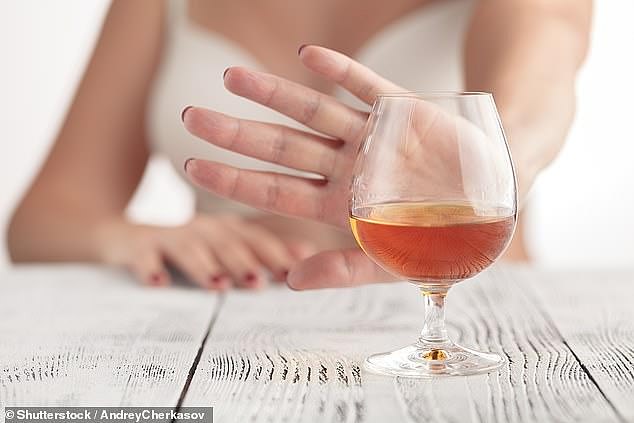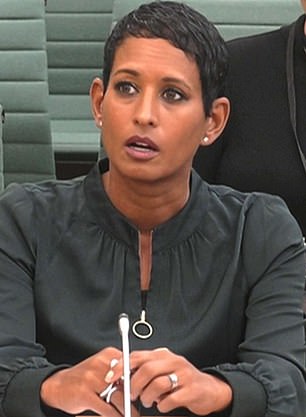DR ELLIE CANNON: I’ve been told to cut down but I still have a craving for alcohol
I’m having trouble controlling my alcohol consumption, even though a blood test showed my liver enzymes were high and the doctor told me to cut down. Is there a medical solution that can help me stop craving drinks? My willpower alone is not enough.
It’s incredibly difficult to ask for help with alcohol addiction, so even expressing the fact that you need it is a big deal.
And while it may seem like a big step, groups like Alcoholics Anonymous are often very successful. It’s not just about willpower: it’s a so-called twelve-step program that depends on support from colleagues. There are regular meetings where no one is judged and everyone does their best to help each other.
There are also other forms of support: anyone can call Drinkline, the national alcohol helpline (0300 123 1110), to inquire about what is available in their area and to discuss quitting.
The alcohol services available on the NHS are area dependent. Again, it is usually local support groups, as well as specialist alcohol services, that provide psychological support and help with detoxification.
GPs can provide regular advice and guidance, as well as setting goals and discussing safe strategies for cutting down.

It’s incredibly difficult to ask for help with alcohol addiction, so even expressing the fact that you need it is a big deal
Quitting alcohol can cause physical problems, so we recommend cutting back slowly to ensure it is safe. We also prescribe specific vitamins, such as thiamine, to prevent some of the problems that can occur, for example insomnia and nausea.
Complete abstinence may seem like an impossible task at first, but smaller steps can be easier, such as switching to low-alcohol drinks.
If I bump my arm or hand, even slightly, blood spots appear. These last for about three weeks and sometimes I look like I am covered in bruises. I’ve been to the doctor, but he can’t explain it and doesn’t seem concerned. Can you give me any advice?
As we age, our skin becomes thinner and more fragile, making spots and bruises more common.
Bruises or blood spots occur when the small blood vessels under the skin are broken by an impact, but small bumps on fragile skin can be enough to cause them.
It is sometimes a hereditary problem, but it can also be related to medications, especially those that thin the blood and prevent clots – warfarin or clopidogrel, for example.
If the numbers are developing faster and faster, it wouldn’t be unreasonable to talk to your GP about why this is happening. It is important to bring up any other problems, such as bleeding gums.
Blood tests can help determine the cause. For someone with new bruises or blood spots, we can perform liver function tests, platelet tests, and screening for blood clots.
Platelets are the smallest cells in the blood and they prevent and stop bleeding. If there is a problem with their levels, it can lead to more bleeding and bruising under the skin. Platelet problems can arise for a variety of reasons and lead to blood spots. As people get older, this can rarely be due to cancer or blood diseases.
Last week I woke up and noticed a small swelling at the back of my head, near the bottom of my skull. It hurts when I press on it. My partner has looked and can’t see any lump or bump, but I’m concerned because I’m sure I can feel the bump is raised. Could it be something serious?
I always say that lumps are an important reason for a consultation with the doctor. Almost all the conditions I see in the clinic are harmless and benign, but it is still very important that a doctor checks them.
A lump can be a sign of cancer, regardless of what part of the body it is located in.
We have glands at the back of the head called occipital lymph nodes. These are normally felt at the base of the skull and may be especially prominent in babies and children.
We’re all used to feeling the swollen glands in our necks when we have a sore throat or an infection, but most aren’t as familiar with these lesser-known ones.
Occipital lymph nodes help fight infections and swell when we are sick with a cold or flu.
The most common lump on the head is a sebaceous cyst. Most people develop at least one during their lifetime.
The cysts feel like a smooth, round lump just under the skin and are normally quite soft. They are harmless and are not normally removed unless they cause repeated infections or frequently remain on clothing.
If a lump is painful, an abscess may have formed – which is not much different from a large sore. In fact, a pocket of pus collects and a painful, hard lump forms. They need antibiotics for treatment, and sometimes minor surgery to drain it.
Is your doctor sexist? I want to know more about it
Does our healthcare system have a sexism problem? Unfortunately, I think they do.

Last week, BBC presenter Naga Munchetty spoke candidly to the Commons Women and Equalities Committee about her own poor treatment in the NHS, after decades of failure and ‘never being taken seriously’ while suffering from heavy periods, vomiting and pain that was so was so severe that she would lose consciousness. .
Naga, 48, pictured above, was eventually diagnosed with adenomyosis last year – a condition where the uterine lining starts to grow into the muscle in the uterine wall.
We women are already in the background before we even enter the doctor’s office, and it is an issue that extends all the way to medical research.
These studies are often only designed to recruit men, meaning less is known about diseases in women. And then there’s the tendency for doctors to consider things like menstrual pain as normal. Therefore, there are delays in the diagnosis of a range of serious diseases that affect women.
I’d like to know your experience: have you been fobbed off, dismissed or belittled by a medical professional? Do male readers have similar problems? Write and tell me your story.
Emergency help for a cold? Not my readers!
I’m relieved to discover that readers of The Mail on Sunday know how to tackle a sore throat without resorting to A&E.
As I wrote last week, hospital data shows an alarming number of people showing up with simple cold symptoms — but I received a flood of letters proving that the simple art of self-care has not been entirely lost. Barbara Willamson was one who wrote: ‘Gargle with salt water and keep the throat lubricated with warm water mixed with honey and lemon. The next step would be to talk to a pharmacist, I wouldn’t go to the emergency room.’
Throat lozenges and sprays were also frequently mentioned, in addition to paracetamol. Who would have thought that?
It’s reassuring to hear how many of you realize that a sore throat usually gets better on its own and that rest is the key. Unfortunately, many patients don’t seem to realize this, when in fact it is one of the best treatments.
